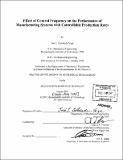Effect of control frequency on the performance of manufacturing systems with controllable production rates
Author(s)
Castañeda Vega, José Israel
DownloadFull printable version (8.638Mb)
Other Contributors
Massachusetts Institute of Technology. Dept. of Mechanical Engineering.
Advisor
David S. Cochran.
Terms of use
Metadata
Show full item recordAbstract
Flow-line manufacturing systems represent the most prevalent process structure in industry for the repetitive production of discrete items. Machine breakdowns, however, limit their reliability and efficiency. The control of flow-line manufacturing systems, as a way to compensate for limited reliability, is about the frequent regeneration of production parameters so that the system output conforms to demand requirements in an acceptable manner. The influence of such regeneration frequency -or control frequency- on the system performance as well as its relevance with respect to other control parameters is, nevertheless, currently not well understood. So far, a continuous control action has been widely assumed in the performance analysis of unreliable manufacturing systems. This assumption follows naturally, given that most of the research work on shop floor control has been focused on job shop environments, such as flexible manufacturing systems. The reason for this emphasis on job shop environments could be the lack of flexibility in production rate of traditional repetitive manufacturing systems. This research work, on the other hand, was motivated by the realization that flow-line repetitive manufacturing systems can be designed for short term production rate control. Current implementations of lean manufacturing are cases of such systems. (cont.) The intended contribution of this work is a better understanding of the influence of control frequency on the time behavior of flow-line manufacturing systems. The development of pertinent simulation and analytical models for performance assessment is presented. From the simulation results, one effect of control frequency on system behavior motivating further research is evident. An analytical model resembling the simulation one is elaborated. The occurrence of control actions is modeled as homogeneous Markov processes. From system stability considerations -or convergence of the analytic solution- a closed expression involving control frequency is derived. According to simulation results, the analytical model predicts very well the limit of controllability of the system (lowest control frequency required for stable behavior) as well as all the steady-state parameters of interest. Additionally, the closed form of the solution allows a direct study of the complementary effect of control frequency with inventory, capacity and availability on system behavior. These results permit fast assessment of system-wide effects of operational control issues during the design of manufacturing systems.
Description
Thesis (Ph. D.)--Massachusetts Institute of Technology, Dept. of Mechanical Engineering, 2001. Includes bibliographical references (p. 119-121).
Date issued
2001Department
Massachusetts Institute of Technology. Department of Mechanical EngineeringPublisher
Massachusetts Institute of Technology
Keywords
Mechanical Engineering.